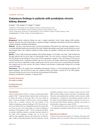 5 citations,
June 1994 in “Journal of Cutaneous Pathology”
5 citations,
June 1994 in “Journal of Cutaneous Pathology” No CD44 in alopecia areata, present in normal and androgenetic alopecia.
 1 citations,
February 2023 in “Deleted Journal”
1 citations,
February 2023 in “Deleted Journal” Diphenylcyclopropenone is effective for treating alopecia areata but has a high relapse rate.
 June 2024 in “Frontiers in pharmacology”
June 2024 in “Frontiers in pharmacology” 2-deoxy-D-ribose gel may help regrow hair in cases of hair loss.
 January 2023 in “International Journal of Zoological Investigations”
January 2023 in “International Journal of Zoological Investigations” Certain genetic variations in IL-16 may increase the risk of alopecia areata.

A man with four autoimmune diseases suggests a new category for multiple autoimmune syndrome.
 82 citations,
August 2017 in “Cell Reports”
82 citations,
August 2017 in “Cell Reports” An imbalanced gut and lack of biotin can cause hair loss in mice.
 April 2024 in “Dermatology and therapy”
April 2024 in “Dermatology and therapy” In Denmark from 1995 to 2016, hospital-treated alopecia areata cases increased, mostly affecting women and those over 50.
 January 2023 in “Malaysian Journal of Medical Research”
January 2023 in “Malaysian Journal of Medical Research” Early and proper treatment is crucial for children with allergic conjunctivitis to avoid complications.
36 citations,
July 2007 in “Journal of Investigative Dermatology” Certain HLA class II alleles increase or decrease the risk of alopecia areata.
 159 citations,
September 2001 in “European Journal of Cancer Care”
159 citations,
September 2001 in “European Journal of Cancer Care” Chemotherapy-induced hair loss significantly affects patients' well-being, and nurses are key in helping them cope, but more research is needed to find effective treatments.
36 citations,
December 2021 in “The journal of allergy and clinical immunology/Journal of allergy and clinical immunology/The journal of allergy and clinical immunology” Two drugs, ritlecitinib and brepocitinib, improved scalp hair loss condition markers.
 11 citations,
March 2016 in “Journal of the European Academy of Dermatology and Venereology”
11 citations,
March 2016 in “Journal of the European Academy of Dermatology and Venereology” Almost all patients with chronic kidney disease not yet on dialysis have at least one skin problem.
10 citations,
January 2018 in “International Journal of Trichology” Mesalazine may help treat extensive alopecia areata effectively.
 5 citations,
February 2013 in “Klinik Psikofarmakoloji Bulteni-bulletin of Clinical Psychopharmacology”
5 citations,
February 2013 in “Klinik Psikofarmakoloji Bulteni-bulletin of Clinical Psychopharmacology” A teenager lost hair due to fluoxetine and sertraline, but it grew back after stopping these drugs and switching to a different one.
 30 citations,
January 2013 in “International Journal of Trichology”
30 citations,
January 2013 in “International Journal of Trichology” The most common causes of hair loss in Jordanian children are fungal infections, autoimmune hair loss, and hair shedding after fever, with zinc deficiency also being a notable cause.
 22 citations,
January 2017 in “Indian Dermatology Online Journal”
22 citations,
January 2017 in “Indian Dermatology Online Journal” Body hair transplants can treat baldness but differ from scalp hair and need more research on long-term results and side effects.
 19 citations,
July 2015 in “Journal of Ginseng Research”
19 citations,
July 2015 in “Journal of Ginseng Research” Korean Red Ginseng may protect against hair loss caused by chemotherapy.
 16 citations,
January 2018 in “Biochemical and Biophysical Research Communications”
16 citations,
January 2018 in “Biochemical and Biophysical Research Communications” Researchers created five new human scalp cell lines that could be useful for hair growth and loss research.
 6 citations,
February 2021 in “Advances in Clinical and Experimental Medicine”
6 citations,
February 2021 in “Advances in Clinical and Experimental Medicine” Wharton's jelly-derived stem cells were safely used to treat four alopecia patients, resulting in hair regrowth in all of them.
5 citations,
March 2014 in “Indian Journal of Dermatology”  3 citations,
June 2023 in “Medicines”
3 citations,
June 2023 in “Medicines” Some antiseizure medications can cause reversible hair loss, with valproate, lamotrigine, and carbamazepine being the most common.
 1 citations,
July 2020 in “Dermatology”
1 citations,
July 2020 in “Dermatology” Photobiomodulation helps reduce pain, lessen inflammation, heal wounds, and can be used in skin treatments. It also boosts hair growth in women with hair loss and may help fight microbes and prevent respiratory issues in COVID-19.
 September 2023 in “JEADV Clinical Practice”
September 2023 in “JEADV Clinical Practice” People with common hair loss conditions may have a higher risk of heart disease and related health issues.
 July 2021 in “Open access journal of biomedical science”
July 2021 in “Open access journal of biomedical science” A lotion with natural extracts significantly sped up hair growth in women with hair loss from chemotherapy.
 73 citations,
January 2013 in “European journal of dermatology/EJD. European journal of dermatology”
73 citations,
January 2013 in “European journal of dermatology/EJD. European journal of dermatology” Antioxidants may help fight oxidative stress linked to autoimmune skin diseases.
 50 citations,
February 2018 in “Biomedicine & pharmacotherapy”
50 citations,
February 2018 in “Biomedicine & pharmacotherapy” Ginseng may help treat cancer and reduce treatment side effects, but more research is needed.
 37 citations,
May 2016 in “Deutsches Arzteblatt International”
37 citations,
May 2016 in “Deutsches Arzteblatt International” Hair loss requires customized treatments based on its various causes and types.
32 citations,
September 2013 in “Breast cancer research” A specific gene variant is linked to a higher risk of hair loss from chemotherapy in breast cancer patients.
24 citations,
August 2020 in “JAMA dermatology” Persistent radiation-induced hair loss is dose-dependent, and treatments like topical minoxidil can be effective.
15 citations,
December 2018 in “International journal of environmental research and public health/International journal of environmental research and public health” EGCG may help treat alopecia areata by blocking certain immune responses and reducing specific harmful immune cells.























